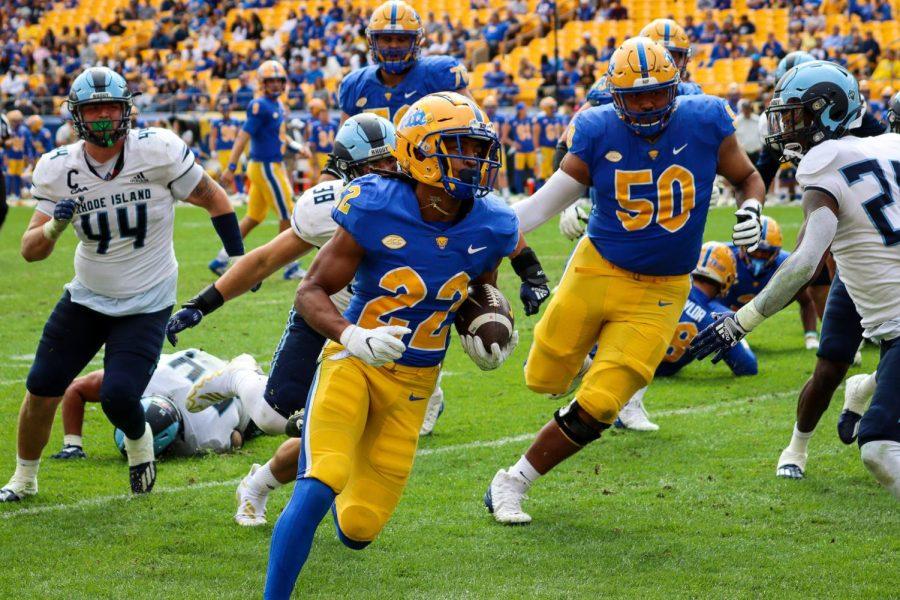Rhode Island takeaways | M.J. Devonshire is a playmaker, Israel Abanikanda might be a Heisman candidate
Ethan Shulman | Staff Photographer
Senior running back Vincent Davis (22) runs with the ball during Pitt football’s game against Rhode Island Saturday afternoon.
September 25, 2022
Pitt returned to Acrisure Stadium on Saturday for its final pre-conference game against FCS opponent Rhode Island. The Panthers came out on top 45-24 and moved to 3-1 on the season.
Despite a less dramatic game than their first two at Acrisure Stadium, there are some things we learned on Saturday — and some things we didn’t.
M.J. Devonshire is a playmaker.
It didn’t take long for Pitt to score its first touchdown of the game. After a quick three-and-out by the Rams on their first drive of the game, junior cornerback M.J. Devonshire returned a punt 82 yards to the endzone.
Devonshire doesn’t have much experience as punt returner, with only two attempts prior to Saturday. But a long punt from the Rams gave Devonshire plenty of room to run, and the rest was history.
Devonshire, a Pittsburgh native, has made splash plays all year for the Panthers. Despite being a defensive player, he’s a weapon with the ball in his hands and continues to prove his worth as a gamebreaker.
His game-winning interception against West Virginia and Saturday’s punt return placed Devonshire in elite company as the first player to return an interception for a touchdown and return a punt for a touchdown in the same season since 2006. The last player to do so? Fellow Aliquippa Quip and future NFL Hall of Famer, Darrelle Revis.
“I guess this doesn’t happen often,” Devonshire said. “It means a lot, though. He paved the way, I just follow it.”
Is Israel Abanikanda a Heisman candidate?
Junior running back Israel Abanikanda has, no pun intended, run away with the No. 1 tailback spot for Pitt in 2022. He rushed all over Rhode Island, setting career highs in both yards and touchdowns, with 177 and four respectively. After logging his third consecutive game with 130 or more yards, Abanikanda is garnering national attention.
Abanikanda has 479 yards and six touchdowns through just four games. Abanikanda is the ACC’s leading rusher and ranks No. 6 in rushing yards nationally.
More importantly, Abanikanda is the heart and soul of this Panthers offense. He’s the first Pitt player with four rushing touchdowns in a game since Darrin Hall in 2017.
Game in and game out he’s made game-changing plays for the Panthers. The better he performs, the more touches he will receive. Abanikanda isn’t worried about an increased workload, though.
“With more touches, there will be more bumps and bruises,” Abanikanda said. “But that’s a part of the game, you have to be a soldier.”
If Pitt continues its early success and moves up the ranks, it will likely be on the legs of Abanikanda — and the Heisman voters will notice.
The Panthers’ pass play calling is too conservative.
Maybe it’s just one game. Maybe it’s the absence of senior wide receiver Jared Wayne. Nevertheless, Pitt’s passing game doesn’t look prepared for conference play. Against the Rams, Pitt’s passing scheme primarily consisted of Run pass options, check downs and screen passes. This worked marginally well against an outmatched FCS opponent, but still, senior starting quarterback Kedon Slovis only threw for 189 yards.
Head coach Pat Narduzzi attributed the short play calling to the defensive scheme of Rhode Island.
“We just took what they gave us,” Narduzzi said. “We didn’t make dumb decisions by throwing to receivers who were covered down the field.”
But against a lesser FCS opponent why not allow your receivers to make a play and build confidence? The Panthers put up 77 against FCS New Hampshire last year. Why be conservative when you have a talent advantage?
Gone are the days of Pitt taking shots down the field to its playmakers. Offensive coordinator Frank Cignetti has completely flipped former offensive coordinator Mark Whipple’s playbook, shifting the Panthers’ offense to a more run-oriented offense. The running game has improved since last year, but the same can’t be said for the passing game which hasn’t eclipsed the 200-yard mark in the past three games.
But this regression is understandable to some extent. The Panthers don’t have a Biletnikoff-winning receiver like Jordan Addison, or a Heisman candidate-level quarterback like Kenny Pickett on the roster. Still, the receiving core is serviceable and has the potential to be one of the best in the ACC if it’s let loose.
In conference play, the Panthers will face defenses that are more athletic and talented than the Rams. If the Panthers find themselves down in a game, I can’t imagine them storming back with a short passing game scheme.
The Panthers’ defense has to limit the big play.
Time and time again the Panthers have surrendered big plays to the opposing offense. Despite a great game by the Panthers’ rush defense, they allowed the Rams to score a 63-yard rushing touchdown in the first quarter.
This wasn’t the only long play of the day for the Rams. Rams quarterback Kasim Hill found wide receiver Paul Woods on a short in-route. Woods caught it and ran 45 yards to the Pitt 29-yard line. This big play gave the Rams a field goal late in the second quarter.
This is a common theme for the Panthers this season. The Panthers allowed a 44-yard rush against West Virginia and a 61-yard pass against Tennessee. The big plays have to stop if the Panthers want to be a dominant defense.
Narduzzi attributed the big plays to youth and lack of focus. For Narduzzi, defensive performance will determine play time down the stretch of the season.
“Some guys earned play time,” Narduzzi said. “And some guys will lose play time based on how they played today. You try to give guys opportunities, but you give a guy an opportunity and he gives up a big run, it’s not good.”
Pitt will take on Georgia Tech this Saturday in primetime. The game against the Yellow Jackets will kick off at 8 p.m. at Acrisure Stadium and air nationally on the ACC network.



